The most reliable electric vehicles aren’t without issues, though they differ from ICE complaints.
Electric cars, SUVs, and trucks are growing in popularity, especially as gas prices soar. But, for many, electric vehicles (EVs) haven’t proven their reliability, at least compared to mainstay vehicles powered by internal combustion engines (ICE).
According to Pew Research Center, 34% of Americans consider EVs less reliable than their ICE counterparts, and 49% see little difference. In actuality, the truth is somewhere in the middle.
As the new kid on the block, EVs are still untested. Let’s dive into how electric vehicles stack up against ICE vehicles (ICEVs) and look at some of the most reliable EVs on — or soon entering — the market.
How Reliable Are EVs vs. ICEVs?
Few vehicle issues are more frustrating and worrying than the yellow check engine light coming to life on your dash. Dashboard warning lights in an ICEV can indicate anything from a simple (and relatively innocent) loose fuel cap to something requiring significant and costly repairs.
EV owners don’t need to contend with issues arising from engines, oil, fluids, and belts, though they can have issues with in-car electronics and systems, noises and leaks, and body hardware (such as Tesla’s infamous door issues).
According to Consumer Reports, EV drivers are highly satisfied and report the highest satisfaction among owners of all vehicles of a 2019 model year or newer. But, this data only considers the satisfaction of current EV owners – those drivers who may overlook some reliability flaws in favor of the other benefits EVs provide.
In fact, EVs aren’t definitively the most reliable type of vehicle.
That honor belongs to hybrid (HEVs) and plug-in hybrid electric vehicles (PHEVs), as well as most other types of ICEVs. In fact, in a 2021 Consumer Reports ranking of average predicted reliability score by car category, the first fully-electric (or battery) vehicle (BEV) category is ranked ninth — with electric SUVs ranked dead last.
Consumer Reports further discovered that 2019 and 2020 EV models have “significantly higher problem rates” than ICEVs (16.34 and 15.65, respectively, compared to 11.58 and 9.56, respectively). And though model year 2021 EVs have a lower problem rate than 2021 ICEVs, certain aspects of EVs are significantly less reliable than ICE counterparts.
What reliability issues can EV owners expect?
EVs are more likely to have software and system issues compared to ICEVs, according to Consumer Reports research. These findings are supported by a similar survey conducted by J.D. Power, which lists infotainment systems, exteriors, and squeaks and rattles as the leading reliability issues experienced by BEV owners.
In contrast, ICEVs experience more mechanical issues.
Surprisingly, although EVs generally suffer higher problem rates in terms of reliability, they’re somewhat comparable to ICEV problem rates on a one-to-one basis. In other words, if you’re shopping around for a new car and aren’t dead set on getting one over the other, reliability probably won’t make or break your decision.
Instead, you’ll probably need to weigh the overall convenience of one type of vehicle over the other: would you rather contend with a slightly increased risk of software issues, or deal with a higher likelihood of mechanical problems?
The Most Reliable Electric Vehicles
It’s not all doom and gloom for EV fans. Typical reliability issues stem from electronic bells and whistles — your EV isn’t likely to break down on the side of the highway while other cars whiz past you.
But some EVs outshine both their electric and gas-guzzling competition. These vehicles let you enjoy all the perks of going electric without significant worries you’ll be putt-putting into the breakdown lane or reeling from buyer’s remorse.
Affordability
The total cost of ownership (TCO) is how much it costs to own a product from the time you purchase it until the end of your ownership. For vehicles, this includes the purchase price, maintenance costs, upkeep, fuel, and everything else that goes into owning a car.
Together, these costs tell you what you can expect to put into your vehicle throughout its lifetime.
A survey conducted by the Nickel Institute found that EVs sell for more than their ICE counterparts. However, EVs retain more value than ICEVs. Additionally, the sticker price of an EV can be reduced via electric vehicle rebates, discounts, and other incentives to reduce the TCO.
Consider the cost of fuel or electricity over your vehicle’s lifetime, too. Charging an EV costs significantly less than it does to refuel an ICEV, even if that vehicle gets a good MPG. And installing a charger at home for use during off-peak hours means potentially capitalizing on a lower utility rate, saving even more than you would otherwise.
Though the TCO of EV ownership is less favorable in the U.S. than in other countries due to lower gas prices and fewer subsidies, EVs almost always cost less over time than an ICEV. The only exception is when an EV is owned for between three and 10 years and used solely for low-mileage purposes; in this case, ICEVs beat out the electric competition.
Two of the most affordable EV options:
2022 Nissan LEAF S
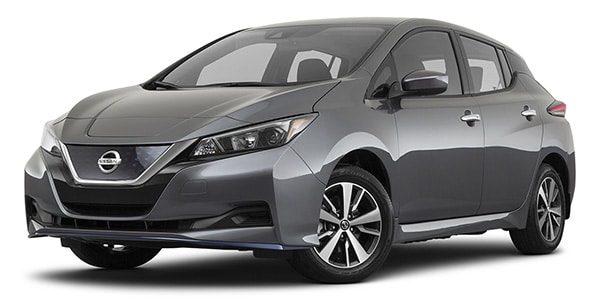
The 2022 Nissan LEAF S starts at an MSRP of $27,400. Because the automaker still qualifies for the federal tax credit, car buyers can walk away with the EV for $19,900, making this hatchback the most affordable EV available.
However, its affordability comes at a cost. The 2022 Nissan LEAF S is limited to an estimated 149 miles of range with its 40 kWh battery. Still, the Consumer Reports reliability rating expects the 2022 LEAF S to be more reliable than the average new car based on its past models’ performance, effectively making this little hatchback a versatile option for drivers that don’t need significant range.
2022 Tesla Model 3 Long Range Dual Motor All-Wheel Drive
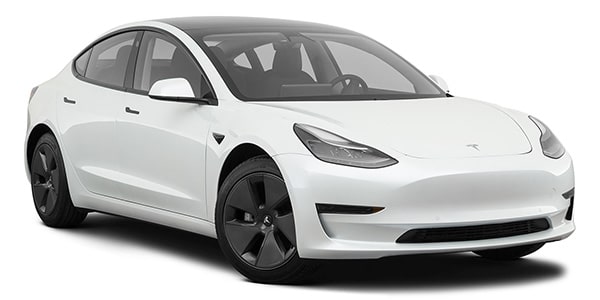
Though the 2022 Tesla Model 3 Long Range Dual Motor All-Wheel Drive (say that 10 times fast) doesn’t have the lowest MSRP — coming in at $55,990 — it’s the most efficient EV to operate. With a range of 334 miles and its two electric motors, the Model 3 Long Range Dual Motor costs just $3.29 per 100 miles of charge.
If affordability means something different to you than simply a low upfront cost, the Model 3 Long Range Dual Motor trim makes for a tempting choice. Based on its three previous model years, Consumer Reports rates the 2022 model as “about average reliability.”
Value
Part of what you consider a reliable car has to do with making sure you get the most bang for your buck. Sure, $20,000, $45,000, or $100,000 cars can all get you where you’re going, but they don’t all retain the same value.
In other words, that attractive and stylish electric vehicle in your driveway could be worth a whole lot less than it appears.
Of the electric vehicles on the market, Kelley Blue Book only ranks two as having significant resale values: the 2022 Ford Mustang MACH-E and the 2022 Tesla Model X.
2022 Ford Mustang MACH-E
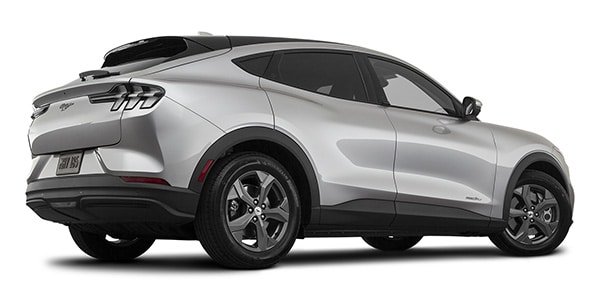
With an MSRP of $43,895 and 247 miles of range for its base Select model, the 2022 Ford Mustang MACH-E makes for an attractive electric SUV. The 266-horsepower Mustang MACH-E is inspired by its namesake and fuses the benefits of EVs into an SUV.
Despite Consumer Reports ranking electric SUVs as dead last in terms of reliability, KBB claims the 2022 Mustang MACH-E holds a resale value of 37.9%. Additionally, Ford EVs still qualify for the $7,500 federal tax credit, which can help offset any potential reliability issues. Consumer Reports believes 2022 Ford Mustang MACH-E owners can expect it to be a more reliable vehicle than the average new car.
2022 Tesla Model X
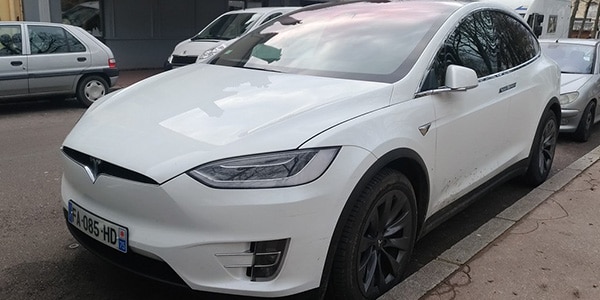
Tesla continues to dominate the EV industry thanks to its Model 3, but it’s the 2022 Tesla Model X that KBB lists as holding the most value, with a resale value of a whopping 57.6%. As a luxury EV, the Model X’s MSRP of $114,990 can set you back a pretty penny — and without any federal tax credit, to boot.
The 2020 Tesla Model X had its fair share of issues — including complaints about its falcon-wing doors. Consumer Reports estimates that the 2022 Model X will be less reliable than the average new car, though this is based on data from the 2020 model.


Maintenance and battery life
ICEVs have a lot of moving, working parts and maintenance needs. And though even the best electric cars aren’t free from maintenance costs, they typically cost $949 annually to maintain — $330 lower than a gas guzzler. On a per-mile basis, EV maintenance tends to cost 6.1 cents per mile, whereas ICEVs total 10.1 cents per mile.
Despite these savings — which can amount to $4,600 over the electric car’s lifetime — EV battery packs have a similar life expectancy to ICEV powertrains. So, though it can be cheaper to own an EV over an ICEV, you may eventually need to pony up a hefty sum when the battery goes kaput.
2022 Chevrolet Bolt EV
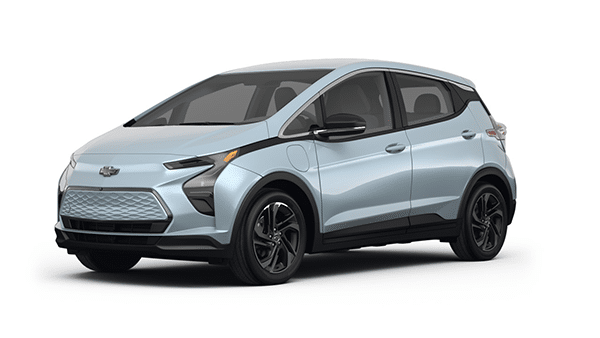
The 2022 Chevrolet Bolt EV hatchback costs an MSRP of $32,495, about $4,000 less than last year’s model. With a battery pack that allows for 259 miles of range, the 2022 Bolt EV is an affordable option for those looking to purchase a new EV.
Part of the 2022 Bolt EV’s affordability has to do with its five-year maintenance cost, which Edmunds estimates at $2,851, or $570.20 annually — $378.80 less than the average EV maintenance cost. However, past model year data leads Consumer Reports to expect less reliability from the 2022 Bolt EV than the average new car.
2022 Kia Niro EV
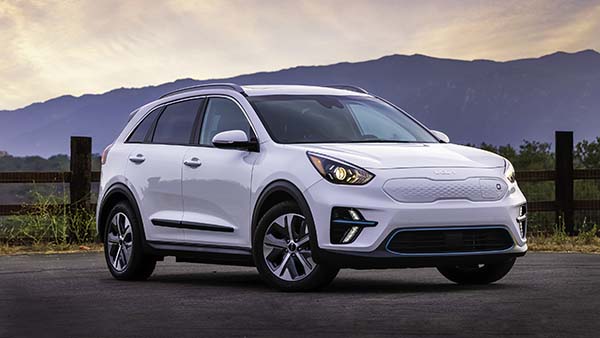
Photo credit: Kia
The 2022 Kia Niro EV crossover boasts 293 miles of range at an MSRP of $39,990, and is eligible for the federal tax credit to drop the cost even lower. The automaker is also hot off the heels of ranking highest overall in vehicle dependability from J.D. Power.
But Kia Niro EV owners are still on the hook for maintaining their crossovers. Edmunds estimates a five-year maintenance cost of $3,854, or $770.80 per year. Still, spending $178.20 less than the average annual EV maintenance cost is a pretty sweet deal. Perhaps unsurprisingly, Consumer Reports expects the 2022 Kia Niro EV to be much more reliable than the average new car.
Reliable EVs Can Save You Cash, but There’s No Clear Winner Yet
Buying a new electric car, SUV, or truck can bring you heaps of benefits. EVs reduce emissions, cut down on fuel consumption, and provide a comparable — or better — driving experience than ICEVs.
The best electric vehicles are dependable and reliable, with any issues typically equivalent to inconveniences rather than outright frustrations. As the market matures and automakers learn from their mistakes (and those of their competitors), these insignificant issues will likely be ironed out.
;)









